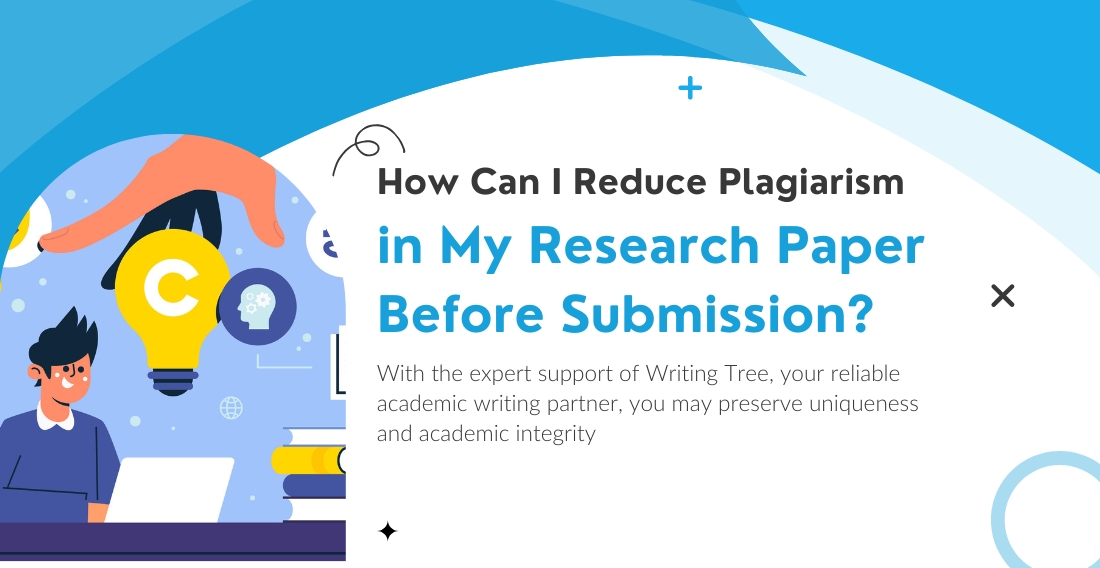How Can I Reduce Plagiarism in My Research Paper Before Submission?
In your academic journey, one of the most important tasks is writing a research paper. But even well-meaning academics occasionally struggle with plagiarism, which is the deliberate or inadvertent repetition of another person’s thoughts or words without giving due credit. Not only can plagiarism damage your reputation, but it can also result in academic sanctions or the rejection of your work.
With the expert support of Writing Tree, your reliable academic writing partner, you may preserve uniqueness and academic integrity by following our step-by-step guidance on reducing plagiarism before turning in your research paper.
Recognize the Signs of Plagiarism
Copying text and pasting it is not the only form of plagiarism. It consists of:
- Direct plagiarism is the act of verbatim copying someone else’s words.
- Reusing portions of your previously published work is known as self-plagiarism.
- Rewording material without giving credit to the original source is known as paraphrasing plagiarism.
- Using synonyms or slight word changes without the appropriate citation is known as mosaic plagiarism.
Knowing these forms makes it easier to spot and steer clear of them when writing.
Effective Paraphrasing
Effective paraphrase entails fully comprehending the source material and rewording it while preserving its meaning. Refrain from just substituting synonyms for words. Rather:
- Once concepts have been well understood, rewrite them from the ground up.
- To be sure your version is unique, compare it to the original.
- Even when paraphrasing, make sure to properly credit the source.
Our skilled academic writers at Writing Tree make sure that paraphrasing is done with care to preserve originality and the context of your study.
Use Proper Citation and Referencing Styles
Always give credit to the original creators of any hypotheses, data, or concepts you use. Certain forms, such as IEEE, APA, MLA, or Chicago, are required by many publications and universities.
To guarantee precision:
- As you conduct your research, keep track of all the sources you use.
- Utilize reference management softwares.
- Before submitting, review the citation requirements set forth by your university.
Writing Tree’s professionals can assist you in creating precise references and bibliographies that meet the specifications of your target journal if you’re confused about citation formats.
Include Original Analysis and Discussion
Your own voice is the best method to reduce plagiarism. Contribute your critical thinking, interpretation, and analysis rather than mostly depending on the efforts of others.
- original works such as
- Individual observations,
- interpretations of data, or
Innovative approaches boost your paper’s legitimacy and scholarly worth.
Run Your Paper Through Plagiarism Checkers
Always check your work with trustworthy plagiarism detection software before submitting it, such as:
- Turnitin
- Grammarly Premium
- Quetext
- Plagscan
By highlighting areas of concern, these tools allow you to make necessary revisions prior to final submission.
Every research paper at Writing Tree is subjected to a plagiarism check using Turnitin to guarantee that there is less than 10% resemblance (or in accordance with the requirements of your university).
Seek Professional Assistance
Even after taking all precautions, academic writing can be complex, especially when balancing originality, technical accuracy, and formatting guidelines.
That’s where Writing Tree can make a real difference.
How Writing Tree Helps You Reduce Plagiarism
Writing Tree offers comprehensive PhD and research paper writing support services designed to maintain the highest academic integrity. Here’s how their expert team ensures your work remains 100% authentic:
Expert Paraphrasing & Rewriting Support
Professional researchers and writers rewrite your content to ensure conceptual clarity and originality while keeping the meaning intact.
Plagiarism Detection & Correction
Before submission, your paper is thoroughly scanned using advanced plagiarism tools, and every overlapping section is restructured to achieve the desired originality score.
Proper Citation & Referencing
Our team formats citations and references accurately as per your university or journal’s requirements (APA, MLA, Chicago, IEEE, etc.).
Customized Research Writing Assistance
From topic selection to thesis writing and journal publication, Writing Tree provides end-to-end academic support, ensuring every document is plagiarism-free, grammatically sound, and research-driven.
Guaranteed Originality & Confidentiality
Every project is handled with utmost confidentiality and comes with a plagiarism report, so you can submit your work with confidence.
Avoiding fines is only one aspect of reducing plagiarism; another is exhibiting integrity, originality, and adherence to academic standards. Using plagiarism detection software, properly paraphrasing, and being aware of citation guidelines will help you make sure your work reflects your true research voice.
Additionally, if you require expert assistance, Writing Tree can aid you at every step, from the research proposal to the final submission, producing papers that are free of plagiarism, thoroughly researched, and prepared for publication.
Frequently asked questions
Most universities and journals accept a plagiarism level below 10%, excluding references and commonly used phrases. However, this can vary depending on institutional guidelines. Writing Tree ensures your document meets your university’s specific standards.
Yes. Modern plagiarism tools like Turnitin can identify poorly paraphrased or slightly modified content. That’s why effective paraphrasing combined with proper citation is essential to maintain originality.
Paraphrasing means expressing someone else’s ideas in your own words with proper acknowledgment, while plagiarism is using those ideas or words without crediting the source.
Writing Tree’s expert writers perform manual paraphrasing, citation corrections, and plagiarism checks using Turnitin. They also provide a detailed similarity report so you can confidently submit your paper.
Yes. Reusing your own previously published work without proper citation or permission is considered self-plagiarism and may lead to rejection by journals or institutions.
Absolutely. Writing Tree guarantees 100% plagiarism-free content, backed by Turnitin reports, expert academic writers, and thorough review processes to meet your university’s requirements.






